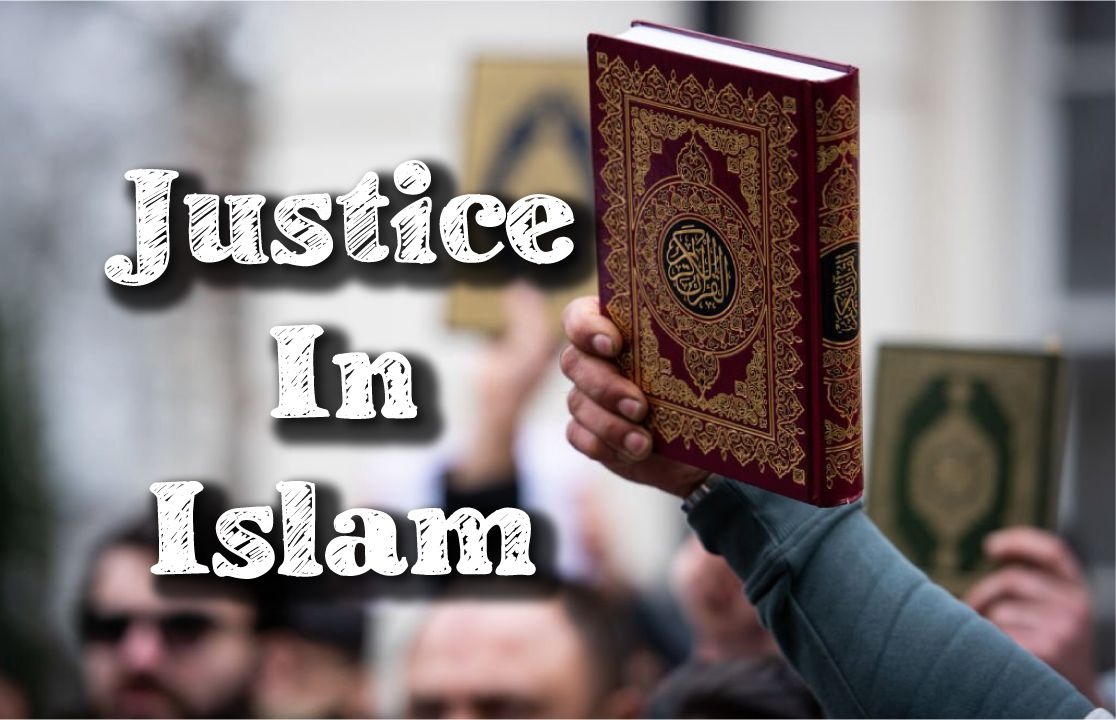Justice is a core value deeply embedded in the teachings of Islam, shaping both individual conduct and societal norms. In the Islamic faith, justice extends beyond a legal concept; it’s a moral and ethical imperative that guides the behavior of believers. This article delves into the profound concept of justice in Islam, unraveling its multifaceted elements. From equality before the law to the principles of social justice, we will explore how Islam defines and promotes justice, emphasizing fairness, compassion, and the welfare of the community. Join us on this journey to understand the essence of justice in the Islamic tradition.
What Is Justice In Islam?
Justice in Islam is a fundamental and central concept that is deeply rooted in the religion’s teachings. It encompasses a sense of fairness, equity, and righteousness in all aspects of life, including social, legal, and ethical matters. The Quran, which is the holy book of Islam, and the Hadiths (sayings and actions of the Prophet Muhammad) provide guidance on justice in Islam.
Here are some key principles and aspects of justice in Islam:
- Equality before the Law: In Islam, everyone is equal before the law, regardless of their social status, wealth, ethnicity, or religion. Justice should be administered impartially, without favoritism or discrimination.
- Protection of Rights: Islam emphasizes the protection of individual rights, including the right to life, property, and dignity. No one should be deprived of their rights unjustly.
- Qisas and Diyya: Islamic law (Sharia) includes the concepts of qisas and diyya, which deal with the punishment for intentional harm or murder. Qisas allows for retaliation in cases of murder or bodily harm, while diyya involves the payment of compensation to the victim’s family.
- Judicial Process: Islamic jurisprudence emphasizes due process and the right to a fair trial. Judges are expected to base their decisions on evidence and witnesses, and defendants have the right to legal representation.
- Charity and Redistribution: Islam encourages the redistribution of wealth through acts of charity (zakat) and almsgiving. This is seen as a means to address economic disparities and promote social justice.
- Equality of Women: Islam advocates for the rights and dignity of women. It grants women the right to own property, inherit, work, and seek education, among other rights. However, interpretations and implementations of these rights can vary.
- Opposition to Oppression: Muslims are encouraged to stand up against oppression and injustice, even if it means speaking out against rulers or authorities who engage in unjust behavior.
- Forgiveness and Reconciliation: While justice is essential, Islam also encourages forgiveness and reconciliation whenever possible. This is seen as a noble act and can lead to the purification of one’s soul.
- Social Justice: Islam places a strong emphasis on social justice, including the care of the poor and vulnerable in society. It obliges the more privileged members of the community to provide for those in need.
It’s important to note that interpretations of Islamic justice can vary among scholars, communities, and countries. Islamic jurisprudence has different schools of thought, and the application of Islamic law can be influenced by cultural and societal factors.
In summary, justice in Islam is a multifaceted concept that encompasses legal, social, and ethical dimensions. It emphasizes fairness, equality, and the protection of individual rights while also promoting acts of charity, forgiveness, and reconciliation.
۞ يَـٰٓأَيُّهَا ٱلَّذِينَ ءَامَنُوا۟ كُونُوا۟ قَوَّٰمِينَ بِٱلْقِسْطِ شُهَدَآءَ لِلَّهِ وَلَوْ عَلَىٰٓ أَنفُسِكُمْ أَوِ ٱلْوَٰلِدَيْنِ وَٱلْأَقْرَبِينَ ۚ إِن يَكُنْ غَنِيًّا أَوْ فَقِيرًۭا فَٱللَّهُ أَوْلَىٰ بِهِمَا ۖ فَلَا تَتَّبِعُوا۟ ٱلْهَوَىٰٓ أَن تَعْدِلُوا۟ ۚ وَإِن تَلْوُۥٓا۟ أَوْ تُعْرِضُوا۟ فَإِنَّ ٱللَّهَ كَانَ بِمَا تَعْمَلُونَ خَبِيرًۭا ١٣٥
Meaning: O believers! Stand firm for justice as witnesses for Allah even if it is against yourselves, your parents, or close relatives. Be they rich or poor, Allah is best to ensure their interests. So do not let your desires cause you to deviate ˹from justice˺. If you distort the testimony or refuse to give it, then ˹know that˺ Allah is certainly All-Aware of what you do.
The Concept of Justice in Islam
Imagine waking up one morning to the sound of gunshots. A man has just been killed. You pass by a home where you hear some children crying, orphaned, and left alone to suffer because of the crimes of other people. On the other side of town, you witness a home that has just been robbed, its residents thrown out mercilessly. You walk past a quiet street and see a car that has been vandalized, its windows broken to shattered glass. Now, just for a moment, stop imagining, switch on the TV, and go watch the news. Chances are you will see all this happening right in front of your eyes, and even more, in our very real world!
Allah says in the Quran:
“Allah commands justice, the doing of good, and liberality to kith and kin, and He forbids all shameful deeds, and injustice and rebellion: He instructs you, that you may receive admonition.” (Surah An-Nahl: 90)
In this study, we will Insha’Allah, explore the different ayaat of the Quran relating to the topic of justice, and how we can apply them in our daily lives.
The Islamic definition of ‘justice’ comes under the same categories. Justice, as defined in the Quran, commands mankind to behave in a fair and just manner. Allah (swt) has commanded us to protect the rights of others, to be fair and just with people, to side with the one who is under oppression, to help and be fair with the needy and orphans, and to be just and not go beyond the boundaries set by Allah, even with our enemies. We are required to be fair and just in all circumstances, and in all situations. We must establish justice in society. This is the law of our Creator.
Allah (swt) says in the Quran:
“Verily, Allah commands that you should render back the trusts to those, to whom they are due; and that when you judge between men, you judge with justice. Verily, how excellent is the teaching which He (Allah) gives you! Truly, Allah is Ever All-Hearer, All Seer.” (Surah Nisa: 58)
Justice: The Law of Allah
Establishing justice is the law of Allah (swt). It is part of the balance which Allah has created. In Surah Ar-Rahman, Allah (swt) describes how He has created a balance of justice, and why:
” And the Heavens He has raised high, and He has set up the Balance (of justice). In order that you may not transgress (due) balance. So establish weight with justice, and fall not short in the balance.” (Surah Ar-Rahman: 7 – 9)
Upon examination of these ayaat, we can understand three different points.
- Allah (swt) has created the balance of justice in this world. This is His Divine Law.
- We are not permitted to transgress against the system of balance that Allah has created.
- Allah (swt) has commanded us to establish weight with justice, and ordered us to refrain from falling short in keeping this balance.
What Are The Elements Of Justice In Islam
Justice in Islam is a comprehensive concept that encompasses various elements, all of which are considered essential for maintaining a just and equitable society. The elements of justice in Islam can be summarized as follows:
- Equality Before the Law: Every individual, regardless of their social status, wealth, ethnicity, or religion, is considered equal before the law. Justice demands that the law be applied impartially and without discrimination.
- Protection of Rights: Justice includes safeguarding the rights of individuals, such as the right to life, property, dignity, and religious freedom. It is the duty of the state and society to ensure these rights are respected and protected.
- Impartial Judiciary: A just judicial system is crucial in Islam. Judges are expected to make fair and impartial decisions based on the Quran, Hadiths, and established legal principles. They should not be influenced by personal bias or external pressure.
- Rule of Law: The concept of justice in Islam upholds the rule of law. This means that society is governed by a set of laws and regulations that are consistent with Islamic principles, and these laws are applied uniformly to all citizens.
- Restitution and Compensation: In cases of harm or injustice, Islam encourages the principle of restitution and compensation. This can take the form of qisas (retaliation) or diyya (blood money), depending on the nature of the harm and the wishes of the victim or their family.
- Procedural Fairness: The legal process in Islam is expected to be fair and just. This includes ensuring that accused individuals have the right to a fair trial, legal representation, and the opportunity to present evidence in their defense.
- Social Justice: Islam places a strong emphasis on social justice, which includes addressing economic disparities and ensuring the equitable distribution of wealth and resources. Acts of charity (zakat) and almsgiving play a role in achieving social justice.
- Opposition to Oppression: Muslims are encouraged to stand up against oppression and injustice, even if it means speaking out against rulers or authorities who engage in unjust behavior.
- Forgiveness and Reconciliation: While justice is essential, Islam also promotes forgiveness and reconciliation whenever possible. This is considered a noble act that can lead to the purification of one’s soul.
- International Justice: Islamic principles extend to the international arena, advocating for peace, diplomacy, and the resolution of conflicts through just means. Islam encourages nations to uphold justice and fairness in their international dealings.
- Ethical Conduct: Justice in Islam is not limited to legal and social matters; it also extends to individual ethical behavior. Muslims are encouraged to be just, honest, and fair in their personal dealings and interactions.
- Responsibility of Leadership: Leaders, whether political or religious, are held to a high standard of justice and fairness. They are expected to govern with justice and prioritize the welfare of the people they lead.
These elements of justice in Islam are deeply intertwined with the moral and ethical principles of the religion. They guide the behavior of individuals and the functioning of the legal and social systems in Muslim-majority societies, with the ultimate goal of creating a just and equitable society in accordance with Islamic teachings.
What does Islam say about justice and equality?
In Islam, justice and equality hold a central place. Muslims are taught that every person is equal in the eyes of God, regardless of their background or status. This means that justice should prevail in all aspects of life, from the legal system, where everyone should be treated fairly, to social justice, which requires helping the less fortunate. Gender equality is also emphasized, although interpretations can vary. Islam encourages standing against oppression and practicing fairness and honesty in personal interactions. The Prophet Muhammad’s life serves as an example of these principles, and Islam advocates for peaceful international relations based on justice. While interpretations may differ among cultures and communities, the core teachings of Islam highlight the importance of justice and equality in the religion’s ethical framework.
How does Islam view social justice?
Islam regards social justice as a central and fundamental principle in its teachings. It emphasizes fairness, equality, and the well-being of the entire community. In Islamic tradition, social justice is manifested through practices like zakat, which obliges those who can afford it to provide for the less fortunate, and by prioritizing the care of vulnerable members of society. Islam also encourages ethical economic practices, like the prohibition of usury and excessive speculation, to ensure that wealth is generated justly. Inheritance laws promote equitable wealth distribution among family members, while Islamic finance discourages exploitative practices. The religion also upholds judicial fairness, opposes corruption, and encourages acts of compassion and generosity. Overall, Islam’s view of social justice is not merely theoretical; it’s a call for tangible actions and ethical conduct aimed at creating a fair and harmonious society where everyone’s needs are met and individuals are treated with equity.
What is the concept of justice in Islam?
The concept of justice in Islam revolves around fairness, equity, and righteousness in all aspects of life, guided by Islamic principles and ethics.
How does Islam define justice?
Islam defines justice as giving every individual their due rights and treating all people with fairness and equality.
What role does social justice play in Islam?
Social justice is paramount in Islam, with practices like zakat and caring for the vulnerable being central to addressing economic disparities and ensuring equitable resource distribution.
Is justice a fundamental principle in Islamic law (Sharia)?
Yes, justice is a foundational principle in Islamic jurisprudence. Sharia emphasizes the importance of impartial legal systems and equal treatment under the law.
Does Islam promote forgiveness alongside justice?
Yes, Islam encourages forgiveness and reconciliation when possible, viewing forgiveness as a virtuous act that can purify one’s soul.
What does Islam say about opposing oppression and injustice?
Islam strongly encourages Muslims to stand up against oppression and injustice, even if it means speaking out against those in power.
Are men and women treated equally in matters of justice in Islam?
Islam teaches that men and women are equal in their moral and spiritual worth, although interpretations of gender equality may vary.
How does Islam view economic justice and wealth distribution?
Islam promotes economic justice through practices like zakat and ethical financial conduct, aiming to reduce economic disparities and ensure fair wealth distribution.
What is the Islamic perspective on corruption?
Islam strongly condemns corruption and dishonesty as grave injustices that harm society.
Is justice in Islam limited to legal matters, or does it extend to personal conduct?
Justice in Islam extends beyond legal matters to encompass personal ethics, emphasizing honesty, fairness, and ethical behavior in daily life.





